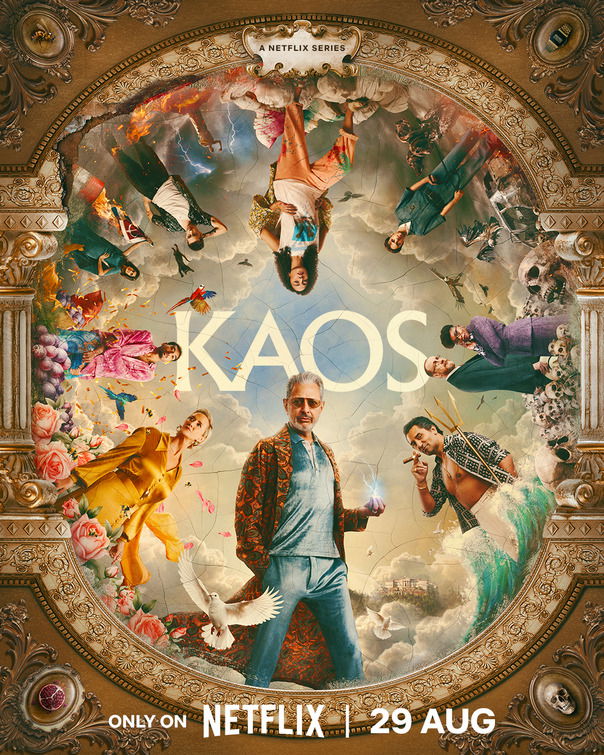“Get the Greek Gods!”

| None | Light | Moderate | Heavy | |
|---|---|---|---|---|
| Language | ||||
| Violence | ||||
| Sex | ||||
| Nudity |
What You Need To Know:
The dominant worldview of the series’ first episode is one of ancient and neopaganism. A story about the deities of ancient Greek mythology is told with enough to keep one’s interest but very little if any, redeeming value. Most characters – god, human, or hero (demigod) – are almost entirely given over to sexual depravity, manifest savagery and selfishness, and abject boredom. For strong foul language throughout, sexual material both hetero and homosexual, and some brief but disturbing violence in Episode 1 with every likelihood of more to come, MOVIEGUIDE® advises families to pass on KAOS.
Content:
(PaPaPa, RoRo, HoHo, LLL, VV, SS, NN, MM): Dominant Worldview and Other Worldview Content/Elements: The dominant worldview of the series is one of ancient and neopaganism. A story about the deities of ancient Greek mythology is told with enough to keep one’s interest but very little, if any, redeeming value. Though there are characters that one feels sorry for, there are almost none to root for. One possible exception could be Orpheus, who seems to really care for Eurydice. Even these protagonists are really only gripping because of their tragic storyline. Most characters – god, human, or hero (demigod) – are almost completely given over to sexual depravity, manifest savagery and selfishness, and abject boredom. Even Euridice has no good reason for no longer loving Orpheus even though she says “I should”. This is a strongly Romantic element which sours even virtue of the “good characters”. The king of the gods is a paranoid dictator grasping to hold onto his power. When the action begins it is one of unregenerate humans against degenerate deities which leaves little to draw any thoughtful and media wise audience, Foul Language: 18 f words, 4 profanities, and 2 obscenities.
More Detail:
In the first episode of the series, Zeus receives guidance from Hera and, oddly, Prometheus, briefly allaying his fears. Yet, some may not tell him the truth. He wonders if certain people, divine or human, are scheming to take him down. A fall from the heights of Mount Olympus might be enough to put the kibosh on even the king of the gods.
This lavish depiction of modern-day Europe dominated by the ancient Greek pantheon has strong production values. The A-list choice of the ever-ebullient and hilariously bizarre Jeff Goldblum for the role of Zeus was a stroke of genius as the actor plays the Greek god of jollity to comedic perfection here. Many of his lines are inspired and side-splitting as he becomes grumpier and grumpier, considering the implications of a troubling prophecy.
However, only some of his co-stars match Goldblum’s outstanding performance. The cinematography is gorgeous, and the series’ concept is intriguing and creative. Despite its promising premise and spectacle, KAOS needs more character development. Dionysius is a god of depraved pleasures. Hera is a wife worse than a harpy. Even the leading human couple, the protagonists Orpheus and Eurydice, are hard to relate to because of their mixed bag of emotional impact.
The show may be going to do something powerful with these two, but at the end of the first episode, the audience doesn’t have much to go on. Also, being lackluster, these postmodern, uncertain, and tentative good guys leave the bad guys to try and capture one with their edgy flare.
Also, the series’ writing contains foul language, which is unnecessary and off-putting. Some of the depictions of the Greek mythological deities are spot on, and the series will probably warrant a second episode watched by many. However, if the character development doesn’t become more profound and meaningful, many will switch to something else on Netflix.
The dominant worldview of the series is one of ancient and neopaganism. A story about the deities of ancient Greek mythology is told with enough to keep one’s interest but very little if any, redeeming value. Though there are characters that one feels sorry for, there are almost none to root for. One possible exception is Orpheus, who cares for Eurydice. Even these protagonists are only gripping because of their tragic storylines. Most characters – god, human, or hero (demigod) – are almost entirely given over to sexual depravity, manifest savagery and selfishness, and abject boredom.
Even Eurydice has no good reason to love Orpheus, even though she says, “I should.” This intensely Romantic element sours the virtue of the “good characters.” The verdict is still out on whether the creative team will make something meaningful of these characters. The king of the gods is a paranoid dictator grasping to hold onto his power.
When the action begins, it is one of the unregenerate humans against degenerate deities, which leaves little to draw any thoughtful and media-wise audience. For strong foul language throughout, sexual material both hetero and homosexual, and some brief but disturbing violence in Episode 1 with every likelihood of more to come, MOVIEGUIDE® advises families to pass on KAOS.



